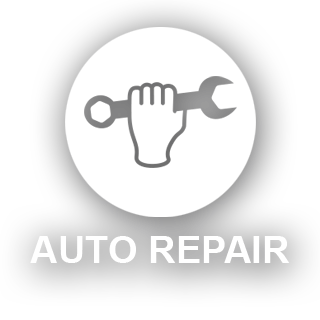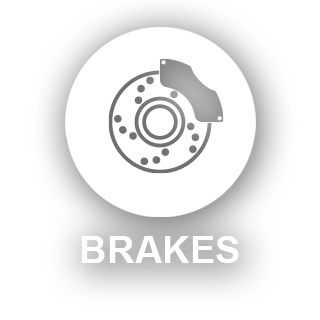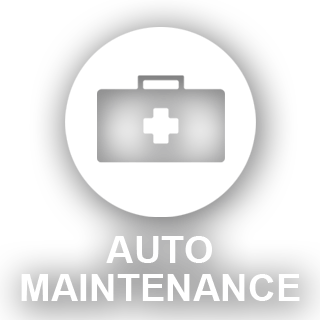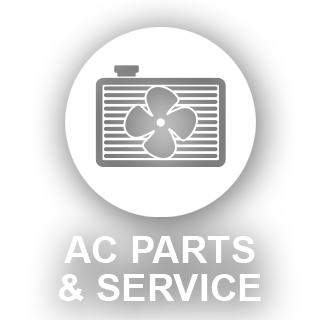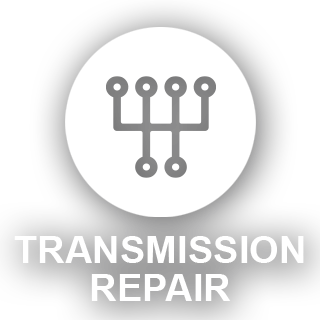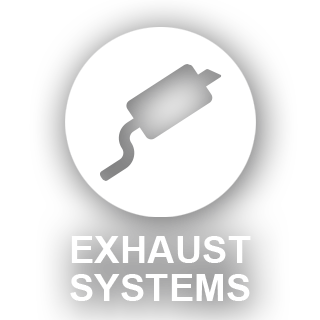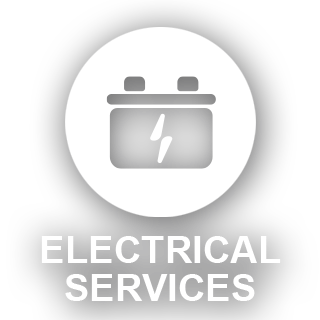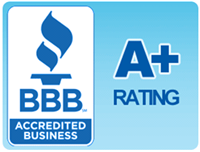Transmission Repair and Service Eugene, Oregon (97402)
Need transmission repair in Eugene, Oregon (97401 or 97402)? Read on for a helpful guide!
Did you know that nine out of ten transmission failures are caused by overheating and transmission fluid contamination? Over the lifetime of your vehicle, its transmission will become congested or clogged with sludge and varnish. Over time, small particles of metal may chip off the gears and contaminate the fluid. Transmission fluid additives can also deplete over time. If vehicle is showing one of the five signs that its transmission is not working properly, take it in to Jackson’s Complete Auto Care in Eugene. Our mechanics are knowledgeable, honest, and friendly. They will inspect your vehicle’s transmission, explain to you what the problem is and their recommended solution(s), and do good work to fix the problem.
Jackson’s Complete Auto Care is an auto repair shop in Eugene, Oregon that stands by its service, work, parts, and prices. We pride ourselves on our integrity and great service. We have been in business for 70 years, and for all those years we have operated under the same principles- do good work, educate people about cars and help them make the best decisions, and always treat people right. If you need transmission servicing, repair, or an inspection, give Jackson’s Complete Auto Care a call, e-mail, or visit, and let us earn your trust!
Transmission Maintenance Essentials
For most Oregon drivers, your vehicle’s transmission will last hundreds of thousands of miles if maintained correctly. Like any other mechanical equipment, your transmission will eventually wear out and need repair or replacement. Proper transmission maintenance and upkeep is vital to the integrity of your car. Below are some tips on proper maintenance. If you have further questions about transmission maintenance, feel free to ask a mechanic when you take your vehicle in for an inspection or service.
Make sure your transmission always has enough fluid.
Transmission fluid provides the necessary pressure to transfer power from your vehicle’s engine to the transmission. It also cools and lubricates it, preventing overheating and wear and tear. When you take your vehicle into Jackson’s Complete Auto Repair, your local Eugene, Oregon auto repair shop for an oil change and inspection, we will check the transmission fluid level and top it off if it is low.
Replace transmission fluid on schedule.
The transmission’s gears grinding against each other cause small metal particles to chip off the gears and contaminate the fluid. Transmission fluid also contains detergents and additives to help your vehicle run more smoothly. Over time, these additives are depleted. Your vehicle’s owner’s manual will have recommendations on how often your vehicle’s transmission ought to be replaced. If you are unsure, ask one of our mechanics for a recommendation on when your vehicle’s transmission fluid next needs to be replaced.
Take your vehicle in for service if you suspect there is a transmission fluid leak.
If you see a reddish fluid on your driveway near your vehicle, your vehicle might have a transmission leak. This can be caused by a faulty hose, gasket, or seal. If you suspect you may have a transmission leak, take your vehicle into your Eugene, Oregon auto repair shop to get checked out.
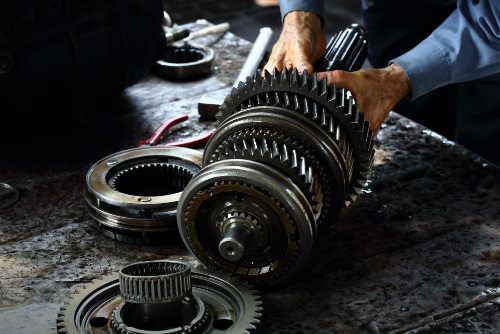
Top 5 Signs Something is Wrong With your Transmission
- Check Engine light is on
- Burning smell (inside or outside the car)
- Car is leaking fluid
- When trying to accelerate, the vehicle’s engine revs but it is slow to gain speed
- Rough/harsh gear shifts, grinding or shaking when changing gears
How Does An Automatic Transmission Work?
When contemplating why transmission repair can be so expensive, it helps to know how an automatic transmission works. Automatic transmissions are one of the great wonders of automotive engineering; what used to take a gear lever, a clutch, and the careful attention of the operator can now be accomplished by the press of a single pedal. All the hard work is done under the hood or in the transmission tunnel. The driver only has to ask for more or less acceleration, and the machine takes care of the rest.
A transmission works by turning very fast rotations of your engine’s crankshaft into (until you reach top gear or overdrive in most cars) slower rotations of your driveshafts, and therefore, your wheels. Why would you want to make something fast go slower in a device built to help slow humans go faster? The answer is torque.
It is said that horsepower sells cars, but torque wins races. Torque measures the force applied to spin the wheels. Horsepower is a little more complicated, and basically described the rate at which the spinning driveshaft delivers the torque to the wheels. Mathematically, horsepower is derived from torque in the equation HP = T*RPM/5252, where “HP” is horsepower, “T” is torque, “RPM” is engine rotations per minute and 5252 magically makes it all work. You can feel torque as the “surge” of power that drags a car forward despite mass and inertia; this is why a truck can feel more powerful from a dead stop than a faster, smaller car: trucks employ larger, torquier engines which must be able to tug hard even at very low RPM.
Every engine produces what is known as a “torque curve.” Like most curve, this one starts low and then rises. In some vehicles, especially smaller economy cars and some performance cars, the torque to be found at low RPMs is severely lacking. Unlike trucks, these cars need to achieve higher RPMs to access higher levels of torque, as well as unlock the possibility for higher overall speeds. Most big engines have long strokes, which means the rod connecting the piston to the crankshaft is relatively long, leading to a wider angle at the crankshaft. Though this arrangement makes these engines stronger at lower RPMs, it also cannot sustain higher RPMs. The same leverage gained by the design means more stress on all the components; at a certain point the geometry simply overwhelms the materials and everything comes flying apart.
Short stroke engines, which for our purposes also include square stroke engines, can (and must) operate at higher RPMs. At lower RPMs, the lack of leverage available due to the short connecting rods and less-extreme attachment angle at the crankshaft mean that the not enough work is being done in the combustion chambers to overcome the resistance the wheels are facing at the road. However, a short stroke engine can achieve higher RPMs than a long stroke engine which means that the overall number of ignition events in the piston bores over a given period of time will be larger and, in aggregate, issue more force over that period of time. This is what we call horsepower, and it’s why sportscars rev past eight thousand RPM – with that many little explosions happening so quickly, the available power is huge… if you can harness it.
This brings us to the wonder which is the automatic transmission. In a manual transmission car, you overcome the engine’s lack of power at low RPMs by disengaging the engine from the transmission with the clutch, and then raising the RPMs to a point where the engine is producing enough torque to overcome inertia and turn the wheels against the weight of the car. This is all at the operator’s discretion, and from time to time the operator fails to deliver enough throttle to make it happen, leading to a stall. An engine stalls when the tiny little explosions inside the piston bores are simply insufficient to overcome the resistance offered by the rest of the vehicle. Though automotive engines are powerful, they are not powerful enough to deny physics. But physics, and specifically mechanical advantage, is one of the amazing tools automatic transmissions employ to help us get around every day.
The other is the torque converter. The torque converter is often lambasted by automotive enthusiasts for the way it seems to suck away power from the engine. This is actually one of the main disadvantages of an automatic transmission: thanks to the way the torque converter works, some power is inevitably lost in the process.
Torque converters work by using a viscous (or fluid) coupling that allows the engine to spin no matter whether the car is at rest or in motion. This fluid coupling means that at lower RPMs, the engine is able to spin more freely. At higher RPMs, as shear forces act on the fluid, it becomes more viscous and spins the rest of the transmission. The delay in this spinning is what leads to the sometimes-sluggish feel automatic cars sometimes have. It also contributes to the slightly poorer fuel economy seen in most automatic cars built any time before the last few years.
This torque converter sends power to compound planetary gears, which through many different components, are able to vary the gear ratio by responding to engine output and load. Older transmissions used to accomplish this process through purely mechanical means, whereas new transmissions use computers to accomplish ever-more precise control.
All of these components are complex beyond the layperson’s ability to easily grasp. Even experienced mechanics sometimes balk at transmission repair.
Here are some of the services we offer at our AAA-Approved Auto Repair facility:
Select an icon below to view more information.


